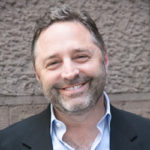 By Daniel Sokatch, International CEO of the New Israel Fund
By Daniel Sokatch, International CEO of the New Israel Fund
The terrible news of another terror attack—this one in the heart of Tel Aviv— broke my heart. Too many people, Jews and Palestinians alike, have died over the course of just a few weeks.
There is never any excuse or justification for terror. Never.
The tragic, painful deaths of these innocent people cut us to the quick. And in thinking and reading about this particular incident, I was drawn to an article by the inimitable journalist and author, Gershom Gorenberg. In his most recent Washington Post column, Gorenberg says things that need saying, even as they are hard to hear, even as, once again, they break your heart.
Gershom writes about how the people who live between the Mediterranean Sea and the Jordan River are stuck “doing the same things over and over, hurting, and getting nowhere.” He talks about the delusions that keep Israelis and Palestinians locked in in this struggle—the delusion, of some Palestinians, that terror might bring them closer to some kind of liberation, and the disingenuousness of Palestinian news outlets when they call Tel Aviv residents fleeing an attack “settlers … inside occupied Palestine.” This does not bring anyone closer to justice or equality; indeed, it pushes justice and equality further away.
And Gershom also addresses the Israeli government’s delusions: Prime Minister Naftali Bennett, he says, will not bring safety to Israelis with his rejection of the two-state solution (officially, at least, still the position of the State of Israel). Instead of a horizon of hope, the only thing Bennett offers Palestinians is despair when he and his allies say they will never fulfill their national aspirations for a state of their own. He also points to the delusion that some in power in Israel continue to hold: that they can keep millions of Palestinians under a military occupation, as they have for the last 54 years, with no consequences and no accountability.
Gorenberg repeats — because it bears repeating — that “killing people makes their neighbors and tribe stubborn, angry, and uncompromising.” On NPR last week I put it this way: “When the horizons for hope are diminished…that creates oxygen and room for the rejectionists…on both sides.” I urge you to read Gershom’s piece in full. It is titled “After the Tel Aviv attack, we need to wake up from the endless delusions,” and you can find it here.
It is in moments like these that we look to those working to build up hope and tamp down despair. And I am proud that so many of them are NIF project partners.
For example, NIFC project partner Tag Meir was founded on the notion that violence and occupation get us nowhere and that the key to a shared future is seeing and believing in a shared humanity. They visit and comfort victims of violence on both sides. Last week, after the terror attack in B’nei Brak, for example, an interfaith group of Tag Meir volunteers paid respects to the families of the two innocent men who were shot there (I was deeply moved and saddened to learn that one of them died protecting his two-year-old son with his body). The day before they went to B’nei Brak, Tag Meir volunteers traveled to Jaloud, a village in the West Bank where settlers had rampaged over the course of three days, terrifying the villagers, burning cars, smashing windows, and wreaking havoc. On Facebook, the organization wrote that the feeling of incitement was palpable: “Jewish terrorists have already murdered a family in a pogrom of this kind,” they wrote, referring to the murder of a family from the village of Duma in 2015. “The next murder is around the corner.”
After the latest terrorist attacks, there were calls in Israel for “Defensive Shield II,” a reference to Operation Defensive Shield, a large-scale military operation into Palestinian towns and cities during the 2nd Intifada in which hundreds were killed. Just two weeks ago, NIFC project partner Breaking the Silence marked twenty years since Operation Defensive Shield. Breaking the Silence’s mission to remind and educate the Israeli public about the horror that comes with occupation and war has never been clearer.
Breaking the Silence army veterans remember well marching into Palestinian cities and towns. On Facebook, they wrote that they remembered “the civilians we encountered, the tanks in the streets, the price that was paid.” In response to calls for an “Operation Defensive Shield II,” and the Israeli army’s recent (albeit limited) incursions into cities like Jenin and Tulkarem, they are publishing testimonies of soldiers who were involved in the original Defensive Shield, and making it clear that these kinds of operations are almost always band-aids—they do not solve the conflict, they attempt to manage it. And “managing the conflict,” without an attempt to address any of the underlying core issues does little to move the sides towards any kind of peace or reconciliation.
Finally, after the terrorist attack in Tel Aviv, the grassroots organization Omdim Beyachad gathered students from its various chapters. In Tel Aviv, Jews and Arabs sat together, talking about how painful this latest spasm of violence has been personally for each of them, how badly they want to replace hatred, violence, and fear with Arab-Jewish partnership, and how, together, they can continue to organize and move the needle on this conflict that has shed too much blood for too many years.
These are tough times. But the New Israel Fund was built for tough times. We will continue to stand with our project partners, and all Israelis—Jews and Arabs alike—who seek and pursue peace, justice, and equality.
As I’ve written in this column before, Passover is the season of our liberation – and we need that light and inspiration now. Sending you all wishes for a happy, healthy Passover, Ramadan, and Easter.
